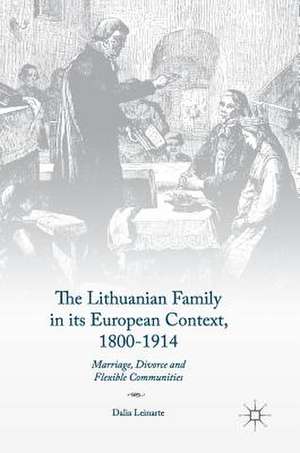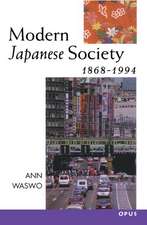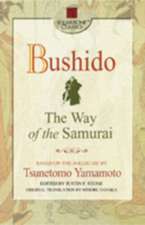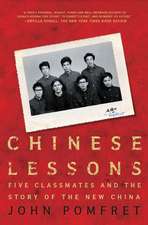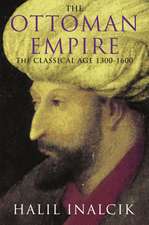The Lithuanian Family in its European Context, 1800-1914: Marriage, Divorce and Flexible Communities
Autor Dalia Leinarteen Limba Engleză Hardback – 26 iun 2017
| Toate formatele și edițiile | Preț | Express |
|---|---|---|
| Paperback (1) | 561.82 lei 6-8 săpt. | |
| Springer International Publishing – 13 mai 2018 | 561.82 lei 6-8 săpt. | |
| Hardback (1) | 570.10 lei 6-8 săpt. | |
| Springer International Publishing – 26 iun 2017 | 570.10 lei 6-8 săpt. |
Preț: 570.10 lei
Preț vechi: 670.70 lei
-15% Nou
Puncte Express: 855
Preț estimativ în valută:
109.12€ • 113.73$ • 90.83£
109.12€ • 113.73$ • 90.83£
Carte tipărită la comandă
Livrare economică 06-20 ianuarie 25
Preluare comenzi: 021 569.72.76
Specificații
ISBN-13: 9783319510811
ISBN-10: 3319510819
Pagini: 192
Ilustrații: XXI, 192 p. 4 illus. in color.
Dimensiuni: 148 x 210 mm
Greutate: 0.5 kg
Ediția:1st ed. 2017
Editura: Springer International Publishing
Colecția Palgrave Macmillan
Locul publicării:Cham, Switzerland
ISBN-10: 3319510819
Pagini: 192
Ilustrații: XXI, 192 p. 4 illus. in color.
Dimensiuni: 148 x 210 mm
Greutate: 0.5 kg
Ediția:1st ed. 2017
Editura: Springer International Publishing
Colecția Palgrave Macmillan
Locul publicării:Cham, Switzerland
Cuprins
Chapter One: Introduction.- Chapter Two: Marriage, Family, Love.- Chapter Three: Divorce and Separation.- Bibliography.- Index
Recenzii
This book was awarded the AABS Book Prize Honorable Mention 2018 by The Association for the Advancement of Baltic Studies (AABS).
“In its consideration of this book, the committee described it as “distinguished by the methodological diversity. [Parts of the book] present a microscopic view evaluating the subjective range of motives and perceptions of intelligentsia or peasants. At the same time, quantitative data and structural analyses are present…reconstructing long-term developmental tendencies.”” (AABS The Association for the Advancement of Baltic Studies, aabs-balticstudies.org, August 12, 2018)
“By using an exhaustive number of studies by eastern and western European scholars, she has updated and given the Lithuanian family a place on a spectrum of the stereotypically progressive Western, and the backward Eastern, European family. … The substance and originality of this work are important for scholars engaged in comparative studies … . This work will no doubt remain the definitive work on the Lithuanian family of the nineteenth and early twentieth century for a long time.” (Virgil I. Krapauskas, Journal of Baltic Studies, Vol. 49 (03), July, 2018)
“In its consideration of this book, the committee described it as “distinguished by the methodological diversity. [Parts of the book] present a microscopic view evaluating the subjective range of motives and perceptions of intelligentsia or peasants. At the same time, quantitative data and structural analyses are present…reconstructing long-term developmental tendencies.”” (AABS The Association for the Advancement of Baltic Studies, aabs-balticstudies.org, August 12, 2018)
“By using an exhaustive number of studies by eastern and western European scholars, she has updated and given the Lithuanian family a place on a spectrum of the stereotypically progressive Western, and the backward Eastern, European family. … The substance and originality of this work are important for scholars engaged in comparative studies … . This work will no doubt remain the definitive work on the Lithuanian family of the nineteenth and early twentieth century for a long time.” (Virgil I. Krapauskas, Journal of Baltic Studies, Vol. 49 (03), July, 2018)
Notă biografică
Dalia Leinarte is Professor of History at Vytautas Magnus University, Lithuania, and a Fellow Commoner at Lucy Cavendish College, University of Cambridge, UK. She is a Chairperson of the UN CEDAW Committee. Leinarte is the author of Adopting and Remembering Soviet Reality: Life Stories of Lithuanian Women, 1945–1970.
Textul de pe ultima copertă
This book investigates marriage and divorce in the nineteenth-century European territories of the Russian Empire. It uncovers the way a peasant community employed unsanctioned marital behaviour, such as cohabitation and bigamy, among others, in order to respond to the external factors that had an impact on the family life, including transmission of inheritance and household structure. Lithuania was part of the Tsarist Empire until 1914. This case study reveals how under often restrictive laws and policies – serfdom up to 1861, and the pervasive role of the Church, in addition to deep-rooted customary practices – women and men manage to normalize their family life. The volume is based on a wide range of archival sources and uncovers familial behaviour both from an individual and community perspectives.
Caracteristici
Awarded the 2018 AABS Book Prize Honorable Mention Investigates marriage and divorce in Lithuania in the nineteenth and twentieth centuries Explores how unsanctioned marital behavior was employed to respond to external factors impacting on family life Reshapes dominant views of religious, social and legal influences on family life in Eastern Europe
